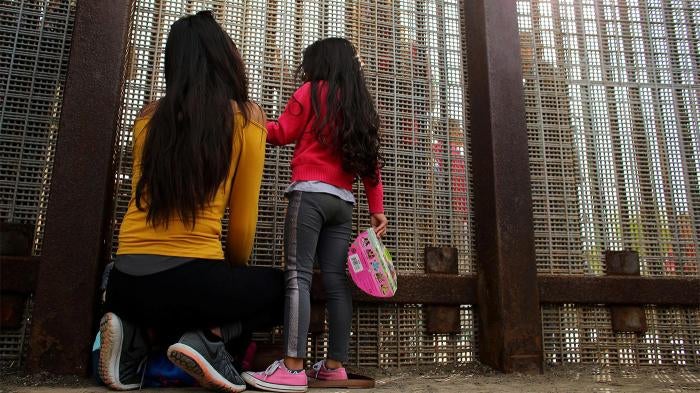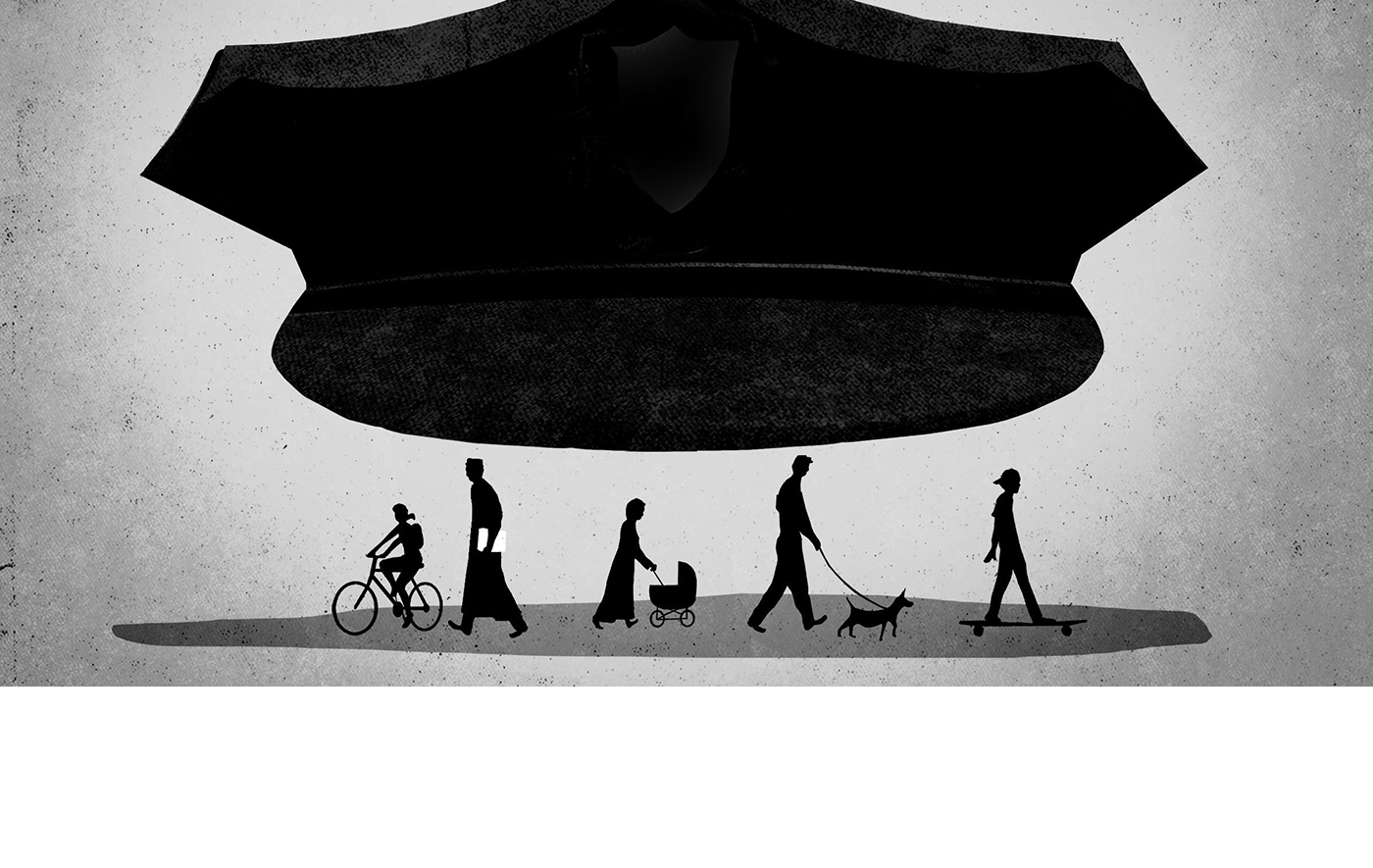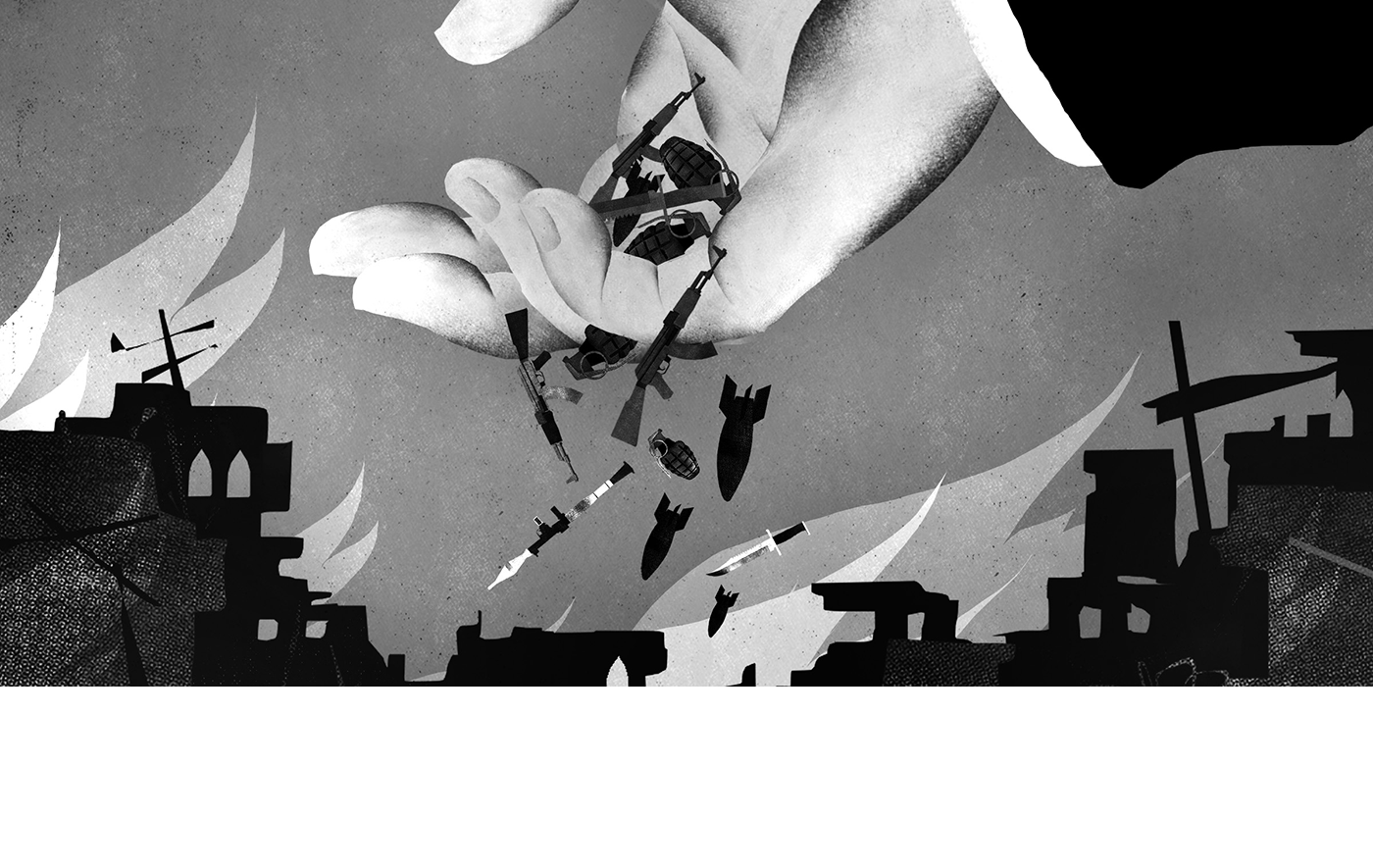The United States has a vibrant civil society and strong constitutional protections for many civil and political rights. Yet many US laws and practices, particularly in the areas of criminal and juvenile justice, immigration, and national security, violate internationally recognized human rights. Those least able to defend their rights in court or through the political process—members of racial and ethnic minorities, the poor, immigrants, children, and prisoners—are the people most likely to suffer abuses.
The election of Donald Trump as president in November 2016 capped a campaign marked by misogynistic, xenophobic, and racist rhetoric and Trump’s embrace of policies that would cause tremendous harm to vulnerable communities, contravene the United States’ core human rights obligations, or both. Trump’s campaign proposals included deporting millions of unauthorized immigrants, changing US law to allow torture of terrorism suspects, and “load[ing] up” the Guantanamo Bay detention facility.
President-elect Trump also pledged to repeal most of the Affordable Care Act, which has helped 20 million previously uninsured Americans access health insurance and to nominate “pro-life” Supreme Court justices who would “automatically” overturn Roe v. Wade, which would allow individual states to criminalize abortion.
Death Penalty
At time of writing, the United States had executed 18 people in 2016, the lowest number since 1992.
Thirty-one states still allow for the death penalty, though in 2016 only five states carried out executions, led by Texas and Georgia. The Delaware Supreme Court ruled unconstitutional the state’s death penalty statute, and the Delaware Attorney General announced that he would not appeal the decision. Nebraska reinstated its death penalty because of a November popular referendum. California residents voted to retain the state’s death penalty.
Harsh Sentencing
2.3 million people are behind bars in the United States, the largest reported incarcerated population in the world. Of those, 211,000 are in the federal system, and 2 million are in state prisons and local jails.
Congress continues to debate limited reform of federal sentencing laws, but it passed no significant reforms in 2016.
At time of writing, President Barack Obama had commuted the sentences of 944 people in 2016 in federal prison for drug offenses; 12,405 other petitions for commutation were pending. More than one-third of the commutations were for life sentences—no parole is available for federal crimes committed after 1987.
The US Sentencing Commission amended its sentencing guidelines in 2016 to broaden its “compassionate release” criteria, expanding eligibility for release both on health grounds and for family reasons.
Policing
Police killings of Alton Sterling in Baton Rouge, Louisiana, and Philando Castile in Falcon Heights, Minnesota, among others, drew renewed attention to US police use of excessive force in interactions with black people. Similar to the progression of events in Ferguson, Missouri, after the shooting of Michael Brown in 2014, protesters in Baton Rouge responding to the shooting of Sterling were confronted by police in riot gear.
Five police officers were ambushed and killed in Dallas by a lone gunman in July.
Youth in the Criminal Justice System
On any given day, approximately 50,000 children in the United States are held in correctional facilities. This number represents a 50 percent drop from 1999, but is still one of the highest rates of juvenile detention in the world. Every US state allows children to be tried as adults under some circumstances, and approximately 5,000 child offenders are held in adult jails or prisons at any point in time.
Iowa, Utah, and South Dakota banned sentences of life without the possibility of parole for child offenders—17 states now ban life without parole sentences for child offenders.
California’s Proposition 57, which gives judges the sole power to grant or deny a prosecutor’s request to remove a child from juvenile court to be tried in adult court, passed in 2016. A similar legislative reform in Florida failed for the second year in a row.
Prison and Jail Conditions
Federal agencies submitted proposed reforms to solitary confinement policies to the White House following a directive from President Obama in March. The Bureau of Prisons also halved the average duration of placements in special management units, a form of solitary for people believed to have gang ties or with a history of serious disciplinary infractions.
At the state level, Maryland passed a bill that requires the collection of data on people in correctional facilities placed in solitary confinement. North Carolina banned the use of solitary confinement for all offenders under age 18. New York, New Jersey, Delaware, and other states considered legislative proposals to reform the use of solitary. New York City’s main jail complex, Rikers Island, ended the use of solitary confinement for 16- to 18-year-olds, and New York Mayor Bill de Blasio announced in October the end to punitive solitary confinement for people under age 21.
The US Justice Department announced in August that the Bureau of Prisons would begin phasing out its use of private contract prisons. The Department of Homeland Security, responsible for housing immigration detainees, announced a review of its own use of private facilities, the findings of which were not yet available at time of writing. President-elect Trump’s proposal to detain and deport millions of immigrants would make it difficult for the Department of Homeland Security to close any facilities, whether private or public.
Voter Disenfranchisement
In April, Virginia Governor Terry McAuliffe issued an executive order restoring voting rights to all persons in Virginia who had been convicted of a felony and had completed their sentences. This restoration of voting rights would have impacted 206,000 people in Virginia. The state supreme court subsequently invalidated that order, however, ruling that the governor lacked the authority to issue such a blanket restoration of voting rights. The governor responded by creating a process to individually restore voting rights to such individuals, and by late 2016 had restored voting rights to some 67,000 Virginia residents.
Drug Policy
All states and the federal government criminalize possession of illicit drugs for personal use (though some have legalized medical or recreational marijuana). Each year, state law enforcement agencies use these laws to make some 1.3 million arrests. More than one of every nine arrests by state law enforcement agencies is for drug possession, making drug possession the single most arrested crime in the US. As a result, hundreds of thousands of individuals cycle through the criminal justice system every year. Those who are convicted often find that their criminal records lock them out of jobs, housing, education, welfare assistance, voting, and much more, and subject them to discrimination and stigma.
Drug enforcement discriminates against black adults. Black adults use drugs at similar or even lower rates than white adults, yet black adults are more than two-and-a-half times as likely as white adults to be arrested for drug possession in the US.
California, Massachusetts, Nevada, and Maine passed ballot initiatives in 2016 that legalized recreational marijuana, following on the heels of prior legalization initiatives in Colorado and Washington State. Florida, North Dakota, and Arkansas legalized medical marijuana. The Obama administration emphasized the need for more public health approaches to drug use, though it stopped short of calling for decriminalization.
Gun Violence
In June, an apparent politically motivated mass shooting at a gay nightclub in Orlando, Florida that left 49 people dead once again opened up public debate about gun control and the high frequency of mass shootings in the US.
In January, Obama announced a series of steps the executive branch would take to reduce gun violence. However, legislative reforms were stalled in Congress.
Rights of Non-Citizens
The US government continues to detain migrant children from Central America with their mothers, many of them seeking asylum. Although modest reforms announced in 2015 reduced the number of families in detention, the US still detains some families for prolonged periods of time. Human Rights Watch has documented the severe psychological toll of indefinite detention on asylum-seeking mothers and children and the barriers it raises to due process.
Abusive detention conditions are also a concern. Human Rights Watch released an analysis of the US government’s own investigations into the deaths of 18 immigrants in custody from 2012 to 2015, revealing dangerously substandard medical care in 16 cases, contributing to the deaths of seven people. Other organizations have documented similar problems in facilities across the country, indicating severely inadequate oversight over a detention system of 200-plus facilities, including privately run facilities and local jails.
In June 2016, the US Supreme Court effectively blocked executive actions by the Obama administration providing a temporary reprieve from deportation to certain unauthorized immigrants. The court issued a split decision that left a lower court’s injunction in place.
In November 2016, President-elect Trump reiterated his campaign promises to build a wall on the US-Mexico border, and to quickly detain or deport 2 to 3 million immigrants with criminal records. The Obama administration, which also focused on deporting immigrants with convictions, deported a record 2.5 million people, with and without criminal records, over its two terms. Any push to rapidly deport millions of undocumented immigrants would almost certainly exacerbate abusive conditions of detention in a sprawling system with poor oversight, and further undermine already weak due process protections.
Labor Rights
The US has no national law on paid family leave. A federal bill to establish a paid family leave program is pending in Congress. Meanwhile, a number of states have enacted paid family leave insurance programs. In April 2016, New York State enacted such a program, joining California, New Jersey, and Rhode Island. Under these programs, workers are eligible for paid leave to bond with a new child, to care for a seriously ill loved one, or to assist with family obligations when a family member is called into active military service.
In the US workforce, women who worked full-time, year-round in 2014 earned 79 percent of what men earned, and the gender wage gap was bigger for black and Hispanic women. The Equal Employment Opportunity Commission receives thousands of pregnancy discrimination and sexual harassment claims every year.
Gaps in US law and regulations allow child farmworkers to work at younger ages, for longer hours, and in more hazardous conditions than children working in any other sector. Child farmworkers often work in extreme heat, exposed to toxic pesticides and other dangers. On tobacco farms, child workers are exposed to nicotine, and many report symptoms consistent with acute nicotine poisoning. Some companies ban children under 16 from working on tobacco farms, but these policies leave older children unprotected. The Obama administration failed to change US regulations, and Congress has not amended US labor law to protect child farmworkers. Tobacco companies have not taken sufficient action to eliminate hazardous child labor in their supply chains.
Right to Health
The criminal justice system continues to act as a barrier to adequate health care for those most vulnerable to HIV, particularly people of color, people who use drugs, sex workers, transgender women, and other heavily policed populations.
The US is experiencing what the Centers for Disease Control and Prevention has called an “epidemic” of opioid use, with 78 Americans dying each day from an opioid overdose. Congress responded with the Comprehensive Addiction and Recovery Act, legislation that authorizes increased support for drug dependence prevention, treatment, and overdose prevention programs. Funding, however, remains uncertain, and access to health care remains out of reach for many, particularly in the 19 states that continue to reject Medicaid expansion under the Affordable Care Act.
In June 2016, the US Supreme Court struck down parts of a Texas law that imposed onerous restrictions on abortion providers. The Texas law required abortion clinics to meet standards for ambulatory surgical centers and required doctors who provide abortions to maintain admitting privileges at local hospitals.
Sexual Assault in the Military
Despite Defense Department reforms, US military service members who report sexual assault frequently experience retaliation, including harassment, poor work assignments, loss of promotion opportunities, disciplinary action, and even criminal charges. In February 2016, the oversight body for US military justice adopted findings and recommendations aimed at ending such retaliation. A Defense Department strategy for combatting retaliation released in April 2016 recognizes the problem, aims to gather and share information about how cases are handled, and emphasizes a range of options for commanders to address retaliation against victims. Various versions of the National Defense Authorization Act would improve transparency and adopt improved protections for whistleblowers, among other steps. At time of writing, the bill was still being negotiated in Congress.
Sexual Orientation and Gender Identity
In 2016, state legislatures introduced a record number of bills seeking to restrict the rights of lesbian, gay, bisexual, and transgender (LGBT) people. North Carolina eliminated local non-discrimination protections for sexual orientation and gender identity and required transgender people to use public facilities that correspond to the sex assigned to them at birth. Mississippi passed a law permitting religious believers to discriminate against LGBT people and unmarried couples. Tennessee passed legislation allowing counselors and therapists to refuse to serve LGBT clients.
In May, the Departments of Education and Labor jointly issued guidance indicating that discrimination on the basis of gender identity constitutes sex discrimination prohibited under federal law. After 22 states and several state and local officials sued to challenge the guidance, a federal court temporarily enjoined the departments from enforcing their interpretation. That litigation had not been resolved at time of writing.
Transgender women in immigration detention have been subjected to sexual assault and mistreatment including indefinite solitary confinement imposed on some purely because authorities lacked appropriate facilities in which to house them.
Violence against Women
In 2016, Obama signed into law the Sexual Assault Survivors' Rights Act, which focuses on collection and preservation of evidence in sexual assault cases. It protects survivors' access to the initial forensic medical examination, and their right to have a rape kit preserved throughout the statute of limitations and be notified if a rape kit will be destroyed.
An estimated 32 percent of women in the US have suffered physical violence from an intimate partner and approximately 19 percent have been raped, with nearly half of these at the hands of an intimate partner. Women in the US are more likely to be killed by a partner, ex-partner, or family member than by any other type of perpetrator.
National Security
The Obama administration made significant gains in releasing detainees at Guantanamo Bay detention facilities to home or third countries, reducing the population from 107 at the end of 2015 to 6o at time of writing. It also continued with plans to hold some 30-40 of the detainees without charge indefinitely, claiming that they cannot be prosecuted but pose too significant a security risk to release. The administration did not adequately explain the basis for these determinations or allow detainees to meaningfully challenge them.
The Obama administration continued to pursue prosecutions against seven men in the fundamentally flawed Guantanamo Bay military commissions—a forum that does not meet international fair trial standards. This includes five men alleged to have played a role in the September 11, 2001 attacks. On the attacks’ 15th anniversary, the case was in its fourth year of pretrial hearings with a trial date still years away. The slow progress is the result of government secrecy about the defendants’ torture in Central Intelligence Agency custody, the novel nature of the court’s untested rules and procedures, and logistical difficulties associated with holding hearings at Guantanamo Bay.
The US did not initiate any new investigations in 2016 into torture committed by the CIA following the September 11, 2001 attacks, despite overwhelming evidence of violations of federal criminal law. The government has also not provided redress to victims of CIA torture. Both prosecutions and redress are required by international law. However, the Justice Department chose not to assert a national security defense known as the “state secrets privilege” in a lawsuit brought by three men against two CIA contractors for their torture in Afghanistan. Failure to assert the privilege allowed the case, a civil suit for compensation, to proceed further than any previous such case.
The US continued to carry out targeted killings, often with the use of aerial drones, against alleged militants outside conventional war zones, including in Yemen, Pakistan, Libya, and Somalia. In July 2016, the director of national intelligence released figures claiming that the US had killed between 64 and 116 “non-combatants” in such strikes since 2009, a figure that advocacy groups―including Human Rights Watch, which investigated several of the strikes―said appeared to significantly undercount the civilian lives lost. When the government released its figures, Obama issued an executive order promising to offer voluntary payments to survivors and families of civilians killed, without regard to the lawfulness of the strike. It is unclear whether the order has been implemented.
Throughout 2016, the US continued to carry out large-scale warrantless intelligence surveillance programs and failed to address the serious lack of transparency, oversight, and accountability in this area. Federal law enforcement agencies also campaigned for expanded hacking and monitoring powers. The US continued to seek the extradition from Russia of Edward Snowden, the whistleblower who revealed the scope of US mass surveillance in 2013.
One of the main laws under which the US currently conducts large-scale surveillance, including of people outside its borders, is section 702 of the Foreign Intelligence Surveillance Act. The law is scheduled to sunset at the end of 2017, and congressional debates concerning whether to reform the law are anticipated during the year. In July, a federal appeals court heard a challenge to the constitutionality of section 702 in the context of an Oregon criminal case; the court’s decision remained pending at time of writing.
Meanwhile, US global communications surveillance practices under a policy directive known as Executive Order 12333 remain shrouded in secrecy, with neither Congress nor the courts asserting a meaningful oversight role. A longstanding effort by the independent Privacy and Civil Liberties Oversight Board to review some of the government’s activities under EO 12333 appeared to generate a backlash: for example, at time of writing, the Senate was considering laws that would prohibit the oversight board from considering the privacy or other rights of anyone other than US citizens and lawful permanent residents.
The Federal Bureau of Investigation (FBI) mounted a campaign to force US technology companies to weaken the encryption they use to protect private communications—a move that would jeopardize human rights globally. The FBI also urged Congress to adopt laws that would allow it to demand individuals’ browsing histories and other internet records without a warrant; the measure failed a procedural vote by a narrow margin, raising the risk of a renewed effort in 2017. Federal law enforcement was more successful in obtaining a new administrative rule that expanded its global hacking powers; at time of writing the rule was scheduled to take effect in December 2016, although legislation had been introduced to prevent or delay its final adoption.
Foreign Policy
In February, Obama made an historic trip to Cuba to mark the restart of diplomatic relations. While Obama raised the issue of political prisoners during a joint press conference with Cuban President Raúl Castro, he did not publicly push US concerns about arbitrary detention, blocked websites, and laws used to punish dissent. In March, Obama traveled to Argentina where he announced the declassification of US intelligence and military documents relating to US involvement during the country’s “dirty war.”
The finalized Trans-Pacific Partnership agreement, which includes side agreements on labor issues in Vietnam, Malaysia, and Brunei, was signed in February by the United States but did not move forward in Congress before the election. Donald Trump’s election victory and his campaign rhetoric against the agreement make it highly unlikely that implementing legislation needed for the agreement will be passed, meaning that the agreement is either dead or will have to be significantly renegotiated.
US-led efforts at the United Nations Human Rights Council produced the council’s first ever joint statement on China’s human rights record in March. However, Obama did not raise major human rights concerns during his visit to China for the G20 summit in September.
Obama traveled to Vietnam in May, where he announced that, despite Vietnam’s lack of progress on human rights, the US would lift the ban on lethal arms sales to the country. During Burmese leader Aung San Suu Kyi’s visit to Washington, DC, in September, the administration announced it would significantly ease remaining sanctions on Burma in the wake of historic democratic elections there.
In his visits to Kenya and Nigeria in August, Secretary of State John Kerry raised concerns about links between human rights violations and insecurity but did little to press partner governments to live up to their rhetorical commitments. After President Kabila of the Democratic Republic of Congo made moves to remain in power for an unconstitutional third term, the US imposed sanctions against several senior Congolese officials.
As violence returned to South Sudan’s capital city in July, the US finally began to push for a UN Security Council arms embargo on the warring parties in an effort to stem atrocities.
In September, the Senate introduced a bipartisan resolution to halt weapons sales to Saudi Arabia, as evidence of unlawful airstrikes by Saudi forces in Yemen mounted. Although the resolution did not pass, it was supported by more than a quarter of the Senate, reflecting fissures in what had been steadfast support for Saudi Arabia in the US security establishment.
The US continues to provide significant financial and technical security assistance to Egypt, despite a report from the US General Accountability Office (GAO) showing that both US and Egyptian authorities have been negligent in human rights vetting of security forces and equipment use.
The US hosted the Leaders’ Summit on the Global Refugee Crisis on the margins of the UN General Assembly in September, resulting in new commitments from donor countries to roughly double the number of refugees resettled globally and provide an additional $4.5 billion in humanitarian funding over 2015 levels.
In September, Obama waived provisions of the Child Soldiers Prevention Act to allow six countries—the Democratic Republic of Congo, Iraq, Nigeria, Somalia, South Sudan, and Rwanda—to continue to receive US military assistance sanctionable under the law, despite their continued use of child soldiers. Obama also waived the law’s restrictions on Burma, even though Burma is not scheduled for US military assistance in fiscal year 2017. The only countries completely restricted were Sudan, Syria, and Yemen, countries to which the United States was not planning to offer military assistance.
The International Criminal Court is analyzing crimes committed in Afghanistan by non-state armed groups, domestic government forces, and international forces, including allegations of disappearances and torture of detainees by US armed forces and the CIA during the Bush administration.






